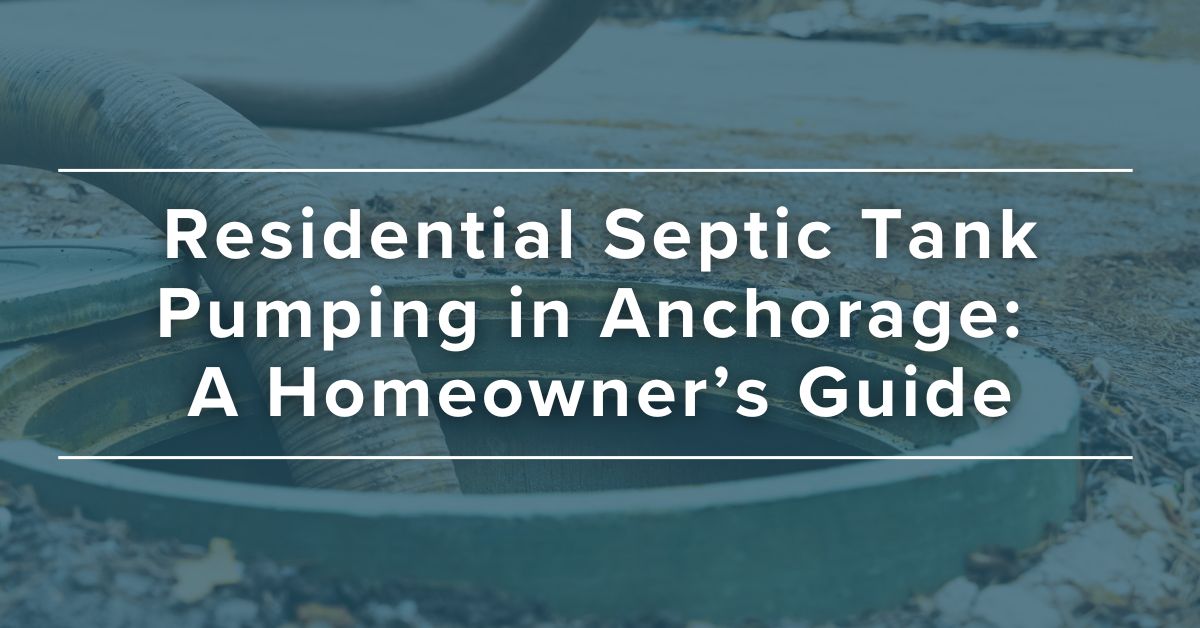
For many homeowners in Anchorage, septic systems are an essential part of daily life—quietly managing wastewater year-round, even through freezing winters. But like any system, your septic tank needs regular care to stay reliable. Neglecting it can lead to costly backups, foul odors, or even damage to your property.
Whether you’ve owned your home for years or recently purchased one with a septic setup, understanding residential septic tank pumping in Anchorage can save you time, money, and headaches.
What Is Septic Tank Pumping, and Why Is It Important?
A septic system works by separating solids, oils, and liquids in your home’s wastewater. Solids sink to the bottom (sludge), grease floats to the top (scum), and the middle layer of liquid effluent flows into the drain field.
Over time, the sludge and scum layers build up, taking up valuable space in the tank. If they aren’t removed through regular septic pumping service, they can overflow into the drain field, causing blockages, foul smells, and even complete system failure.
Routine pumping prevents these problems by clearing out accumulated waste, allowing your system to function efficiently for decades.
How Often Should You Pump Your Septic Tank in Anchorage?
A common question homeowners ask is: “How often should I pump my septic tank?”
The answer depends on several factors, including:
- Household size: More people mean more wastewater and faster buildup.
- Tank size: Smaller tanks fill up faster than larger ones.
- Water usage: Long showers, laundry, and dishwashing can accelerate accumulation.
- Garbage disposal use: Food waste can add extra solids to the system.
In general, most Anchorage homeowners should plan septic pumping every 3 to 5 years. Homes with larger families or heavy water use may need service more often 2 to 3 years.

If you recently bought a home and don’t know when the last service occurred, it’s best to schedule an inspection right away.
Septic Tank Maintenance Tips for Alaska Homeowners
Anchorage’s cold climate presents unique challenges for septic systems. Freezing temperatures, ground frost, and heavy snow can all affect your system’s performance. These septic tank maintenance tips can help you avoid mid-winter emergencies:
- Insulate your system: Keep grass or mulch over the tank and drain field to provide insulation during the colder months.
- Schedule pumping before winter: The ground can freeze early, making access difficult for service trucks.
- Avoid driving or parking over your tank or drain field: Weight can compact the soil and damage underground components.
- Conserve water: Fix leaks and space out laundry loads to prevent overloading your system.
- Be mindful of what you flush: Only toilet paper and human waste should go down the toilet. Grease, wipes, or chemicals can upset the balance of bacteria that break down waste.
Simple habits like these go a long way toward extending the life of your system and reducing the need for emergency service.
Warning Signs You Need Septic Pumping
Even with great maintenance, every septic system eventually needs attention. Watch for these signs that it’s time to call for septic pumping service:
- Slow-draining sinks, tubs, or toilets
- Gurgling noises in the plumbing
- Sewage smells indoors or outside near the tank
- Standing water or wet patches in your yard
- Sewage backing up into drains or toilets
If any of these occur, it’s likely your tank is full, or your drain field is struggling to absorb wastewater. Either way, it’s best to schedule residential septic tank pumping immediately to avoid permanent damage.
When You Need Emergency Septic Pumping
Sometimes, septic issues happen without warning. A sudden backup or overflowing tank can quickly become an emergency. In these cases, fast action is key.
Emergency septic pumping can remove the immediate waste buildup and prevent contamination or property damage. Professional technicians can also inspect your system to identify underlying issues (such as blockages, root intrusion, or system freezing) that may have caused the problem in the first place.
If you’re experiencing strong odors, backups, or soggy ground around your septic area, don’t wait. Anchorage’s subzero temperatures can make problems worse overnight. Call for 24/7 emergency service right away.
Schedule Your Next Septic Pumping Service in Anchorage
To be frank, if you’re reading this article, then it’s probably because something is going on with your septic tank. So let’s just get you scheduled: Click Here.
Routine residential septic tank pumping in Anchorage is one of the best investments you can make in your home’s plumbing system. Not only does it prevent costly repairs and health hazards, but it also helps protect Alaska’s environment by keeping groundwater clean and uncontaminated.
If it’s been several years, or you’re unsure when your tank was last serviced, now’s the perfect time to schedule an inspection and pumping. A professional will check your system’s condition, measure sludge levels, and make recommendations for your ideal pumping schedule.
Keep your home running smoothly year-round with regular maintenance and timely service.
